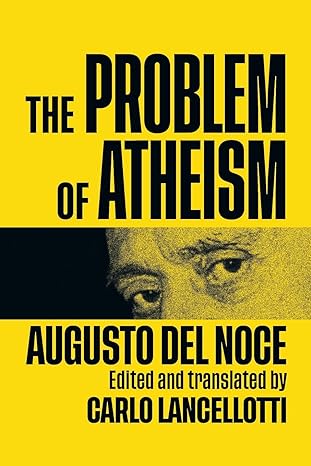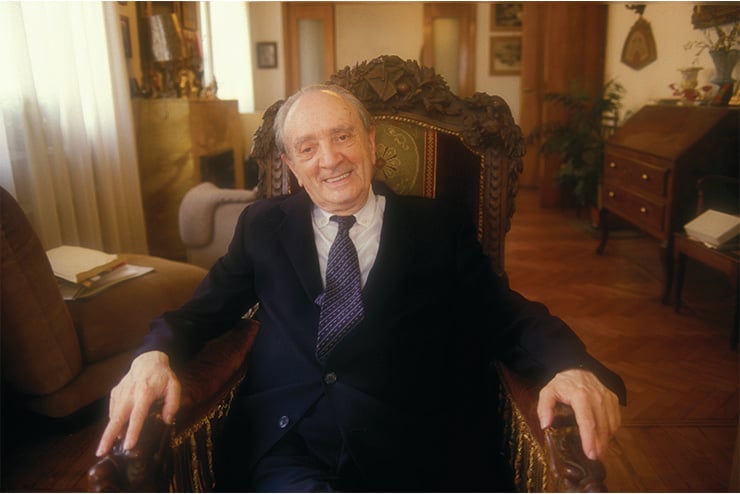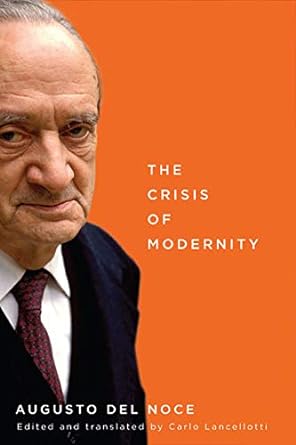Observer of the Marriage of Marxism and Western Liberalism
The writings of Italian Catholic philosopher Augusto Del Noce (1910-1989) aroused a great deal of interest when they first became available in English in recent years. One reason is that he was presenting an analysis of post-1960s Italian society that also explained the situation we face in America, but from a very different perspective.
Del Noce viewed politics and philosophy as inseparably linked and believed that now, more than ever, society had to be understood in reference to the history of its thought. In his account, the dominant philosophy in Italy from the 19th century to the end of World War II was philosophical idealism. That position had little to do with the American understanding of “idealism” as a matter of lofty sentiment. It held that there is a progressive tendency in history toward freedom and enlightenment. That tendency has developed by stages so that achievements from earlier stages are preserved in later ones but in a different form.
Its followers thought that in modern times the tendency toward freedom and enlightenment had involved secularization. That meant that as the transcendent Christian God was disappearing, what was valuable in Christianity was being preserved in this-worldly form, for example, in the general recognition of human dignity. This process was called immanentization. If you did not accept it, people said you were trying to step outside the movement of history and could not be taken seriously.
The supposed justification for that position was the explanatory power of the historical evolutionary view. For example, it could explain orthodox Catholicism as a historical development and show how what was worth keeping in it had become part of what succeeded. In contrast, orthodox Catholicism could not explain the historical tendency away from the Church without simply rejecting the present world as an unmitigated disaster. And that is not a view many people would want to live with.
That justification depended on treating “history” as a unitary one-way process that determined all human reality. In essence, it relied upon the deification of history. Nevertheless, political violence during the interwar period and the catastrophe of World War II created problems for the vision of history as unitary, progressive, and cumulative, with modern Europe at the forefront. Modern Europe had fallen into barbarism, and intellectuals had not offered effective opposition. Since they had viewed their outlook as the summation of long centuries of culture, and that outlook had evidently failed, they concluded that European culture had failed.
Despite the assertively revolutionary character of fascism and Nazism, postwar European intellectuals saw them as reactionary movements that attempted to do through violence what traditionalists had been trying to do through other means. Traditionalism, they had come to think, is simply opposition to change in the name of a sacralized vision of the past, inspired by the desire to hang on to unjustified privilege. It eventually turns to violence in a desperate attempt to stop the movement of history.
Attachment to European heritage thus meant fascism from the perspective of leading intellectuals. Marx offered an alternative that rejected European heritage while maintaining faith in historical progress through the concept of total revolution, and thus they adopted it. The experience of resistance against fascism supported that move psychologically. The Resistance had been all-consuming, and it was hard, especially for young people, to see it as a practical alliance among all those who opposed barbarism. They wanted to see it as part of a single world-transforming movement for liberation. And the communists, who had been important in the Resistance, aimed at transforming the world.
Marx was a thoroughgoing atheist. For him, there would be no preservation of the essence of Christianity in culture after the disappearance of the Christian God. That disappearance would, therefore, have radical consequences. In particular, people would have to create their own values. Marx thought that would happen as part of the communist revolution. People would take back the powers they had alienated from themselves and projected onto something external. So they would take back both the political power with which they had endowed the state and the creativity and other qualities they had projected onto a deity. Both God and state would then disappear.
Marx thus believed in a truly radical transformation of the world based on absolute human autonomy. But he was also a historical materialist. For example, circumstances like the state of technology would determine the organization of economic production. That, in turn, decided who was positioned to control the process, pocket the profits, and hire priests, poets, and professors to explain why the resulting state of affairs was the way things ought to be. Material considerations have thus determined not only politics but religion, culture, social ideals, and so on.
From this perspective, history is the history of struggle between economic classes. Marx thought that in the future capitalist exploitation powered by technology would lead to ever greater production but also ever-growing misery for ever-growing numbers of people. Eventually the miserable proletariat, by far the greater part of the population, would revolt, seize the means of production, and establish community of ownership. That would be the communist revolution, which would create a society in the interests of the great mass of the people and thus abolish exploitation and class struggle.
Marxism thus combined two things: belief in historical progress, which would be achieved through struggle and lead to absolute human autonomy, and a materialist understanding of the world. Both implied radical debunking of existing traditions, ideals, and culture. These were human inventions, since man is autonomous, and the traditions we have today were invented simply to justify the position of the ruling class.
Not surprisingly, the theory fell apart repeatedly. If history is a material process, why think it will end well? If it is mechanistic, where does absolute human autonomy fit in? Also, how is the proletariat, which has been fed nothing but ruling-class propaganda, going to figure out how to bring about a utopia that does not correspond to anything in today’s class-based ideals? Beyond that, Marxism believed in actual consequences rather than ideal goals or objective truth. So, when Marxism did not work as promised, it refuted itself.
In Del Noce’s view, the history of the 20th century was the history of that process of self-refutation in its various aspects. Early on, he says, Mussolini and the fascist theoretician Giovanni Gentile had adopted the activist aspects of Marx’s thought while getting rid of the historical materialism. The result was Italian fascism, which was strong on action but weak on ultimate goals. Somewhat later, the inevitable real-world consequences of efforts by a self-appointed vanguard to push the Marxist revolution forward led to Stalinism and its mirror image, Nazism.
As time went by, Marxism also had to compete with what the West was becoming. Likewise, the West began invading Marxism’s intellectual territory by becoming more materialistic. The leaders who emerged in Western Europe after the war often were devout Catholics, and their vision of reconstruction included spiritual and cultural themes. Later, the themes that dominated discussion of the nature and future of Europe shifted to things like economic prosperity and the open society that seemed better able to compete with communism on its own material and radically secular ground. Those themes were also more in line with the concerns of Western elites, who had no interest in religious or spiritual considerations that might prove inconvenient. They drew support from Western progressives, who wanted to reconcile liberalism and Marxism by eliminating all residue of tradition from liberalism and the prophetic element from Marxism.
So, Marxism was accumulating problems. Once widespread postwar prosperity eliminated the possibility that working-class misery would lead to revolution, its vision of social transformation vanished altogether. The revolutionary aspects of Marxism had thus refuted themselves by the same pragmatic standard it postulated. What was left were its materialist aspects, including its debunking of religion, culture, civilized standards, and so on. As these were perfectly consistent with what bourgeois society was becoming, the two, in essence, merged.
And that merger, according to Del Noce, is how we got our present society. That society, which had become fully defined by the end of the 1960s, comes out of the disintegration of Marxism, which had itself come to intellectual dominance because of the collapse of what had been, in effect, a religion of progressive cultural evolution.
As such, our present society is based on what Del Noce called “scientism” (the attempt to limit knowledge to what modern natural science can tell us) and “eroticism,” along with a theology of secularization that gives religion a this-worldly focus. Scientism makes no rational sense because science, by definition, cannot tell us whether scientism is correct. Thus, scientism’s own fundamental principles tell us that it is an arbitrary assumption. Even so, our rulers like scientism because it justifies a wholly materialistic world view.
Eroticism is important, Del Noce says, because it stands for the increase of vitality and for the absence of any objective conception of the good that becomes the goal of life. Abolishing sexual taboos also promotes a materialistic view of man. It wrecks the family and, with it, the ideas of tradition and authority, and thus the social presence of the transcendent. That seems to be one reason for Del Noce’s comment that “the problem of sexuality and eroticism is today the fundamental problem from the moral point of view.”
Finally, a theology of secularization is needed to make the religious impulse support a totally secularized order rather than raise issues that would put it in question.
Del Noce considered today’s Western society essentially fraudulent. Its rationality is, in fact, irrational because it imposes an arbitrary limitation on what counts as knowledge. Its freedom is essentially totalitarian because it does not allow people to question it by raising the possibility of standards higher than scientism and eroticism.
Further, the postwar triumph of Marxism in the West has led—as it did earlier in Russia—to the triumph of the tendencies Marxists hated most in the previous form of society. Del Noce uses the expression “bourgeois spirit” to refer to the tendency to treat everything as an object of individual acquisition and use. He says contemporary materialism abolishes common goods, and so deprives human ties of any real basis. Marxism, which began by talking about solidarity, has thus led to an individualism that is altogether asocial, leaving people no motive for action other than using what is around them to advance their own goals.
That attitude extends to human relations. Consider the feminism now reflected in law, which emphasizes equal careers. Progressives say it enables women to participate fully as equals in modern society, allowing them to share in the universal equal recognition promised by liberal democracy. Instead, Del Noce would say, it turns them into equal objects of use because it makes them wholly available to businesses and governments as consumers, taxpayers, and human resources. It also leads them to treat their closest human connections instrumentally as something to maintain or cut off in accordance with their changing goals. That is the meaning of abortion, divorce, and universal daycare.
“Liberated” women will always have to sell themselves in some way, whether as employees or in a more personal manner. That tendency is exacerbated by the replacement of the economic and social revolution, which involved class solidarity, by the sexual revolution, which destroys stable human bonds and treats other human beings as objects for acquisition and use. Instead of fighting economic exploitation, today’s progressives fight repression. They will sacrifice anything before they sacrifice their positions on homosexuality and transgenderism.
The sexual revolution thus radicalizes the bourgeois spirit of acquisition and use. It also makes people politically inactive—disconnected from each other and concerned only with their impulses and personal complications—and so tends to stabilize the new form of society.
It thus acts as a powerful conservative force in the sense in which progressives understand conservatism. The left does not see tradition as a vehicle for goods that transcend desire because they do not believe in such things. That is why they see the concerns of the political right as simply the defense of the status quo, whatever that may be. Establishment Republicans in America provide an example of what progressives have in mind when they speak of conservatism.
Given that understanding, Del Noce notes that the post-’60s world stands for the “climax of conservatism because it professes a complete relativism about values,” and without values that go beyond conflicting desires there can never be a reason to change anything basic. Under such circumstances, politics becomes a “management technique at the service of the strongest.” The disintegration of Marxism has thus turned it from a radicalism that says everything must change to a conservatism that ensures nothing can change. That is the reality behind claims that history has ended.
Radical individualism and the destruction of tradition and culture also abolish the notion of nations as moral entities to which citizens owe loyalty and support. But when they are gone, Del Noce tells us, large economic organizations are the only centers of effective power. So pure economic power ends up running everything, including government, which becomes its servant. The World Economic Forum and the so-called Great Reset are useful symbols of this process, in which the Marxist analysis of social authorities as agents of economic class interest becomes ever more accurate, while the Marxist remedy disappears ever more completely.
Although Del Noce does not discuss the point, the disintegration of Marxism in Europe has had the same outcome as the persistent single-minded application of the principles of consent and equal freedom in America. In both cases, the absolute sovereignty of man drove objective human goods out of public discussion. The results have included relativism, destruction of human connections, a startling emphasis on sexual matters, and a society that delivers exactly the opposite of what it promises. That situation makes no sense, so awkward questions have to be suppressed: people have to be shut up, religion neutered, a comprehensive system of lying established, and scapegoats picked out and persecuted.
The evolution was similar on both sides of the Atlantic. American politics during the Industrial Age started with ideas of progressive reform. Down to the 1960s, they tended toward a reformist progressivism that wanted to blur religious distinctions and doctrines and organize the world in a more comprehensive, technologically rational, and materially beneficial way. At the same time, people thought they could maintain what was of value from the past, including traditional family relations and understandings of morality.
That approach lasted somewhat longer in America than in Italy, largely because we were a less divided society, and we avoided the violence of the interwar period and World War II. But in the 1960s, it fell apart when student rebels in both countries adopted a revolutionary outlook that viewed all established institutions as evil. Not everyone agreed with them, but eventually their view prevailed because the authorities had no solid arguments against it.
Del Noce noted that the student revolt began as a reaction against the technocratic consumer society that had grown up since World War II. The students complained about materialism, careerism, blandness, and superficiality—about “plastic people,” as the Americans put it—along with inequality and militarism. Since they could not explain the problems or what to do about them, they decided all established institutions were bad—traditional and religious institutions and technocratic ones. The result was that they rejected them all in favor of vivid experience and generalized rebellion. That, they thought, would enable them, in the words of The Doors singer Jim Morrison, to “break on through to the other side” and create a new, liberated society.

Of course, it did not work. The destruction of tradition meant technocracy came back stronger than ever, resulting in even more commercialism, bureaucratization, alienation, and sexual and racial rancor—not to mention unhappiness and wrecked lives. The basic principles of public thought made it impossible to recognize the causes. Hence, the failure of the anti-traditional outlook led only to redoubled efforts to extirpate tradition and the transcendent that have continued to the present.
So what now?
The forces supporting the current state of affairs are immensely powerful. Critics have not articulated a contrary vision that a propagandized, browbeaten, largely corrupted, and hopelessly divided public finds compelling. To help with that, we will need, among many other things, to explain what is wrong with current understandings and how to put public ways of thinking on a more productive footing.
And on that point, Del Noce says he can help. He says the rejection of classical metaphysics, divine transcendence, and the order of being—needed to distinguish justice from violence and authority from power—is at the root of our modern difficulties. And he attributes that rejection to defects of understanding that could have been and still can be avoided.
To remedy the situation, Del Noce proposes a reinterpretation of post-Cartesian thought so it can be seen to lead to something more sustaining and more adequate to reality than today’s progressivism. There is no space here for the details of his proposal. Still, he is certainly right that we need to deprive progressives of their claim to superior rationality and supply an account that better makes sense of the world and points the way to improvement. For that reason, among many others, we in America need to attend to the thought of this idiosyncratic and very Italian thinker.


Leave a Reply